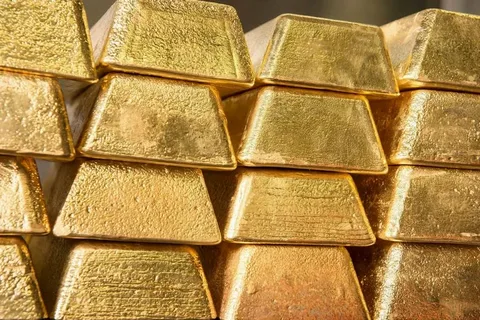Gold prices have been surging in the market, triggering a frenzy of investment activity. With the increase in gold prices, investors are flocking to the market to capitalize on the opportunity. The rising gold prices have created a sense of urgency among investors, leading to a surge in investment activity. This trend is indicative of the growing significance of gold price in the market and its impact on investment decisions.
Surging gold prices have recently sparked a wave of investment frenzy in the market. As uncertainty looms over the global economy, many investors are turning to gold as a safe haven asset. The demand for gold has surged, leading to a sharp increase in its price. This has prompted both individual and institutional investors to flock to the market in search of the precious metal, driving further investment activity. The current upward trend in gold prices shows no sign of slowing down, fueling the investment frenzy even further. As a result, the market is experiencing heightened volatility and increased competition for gold resources.
The Current State of the Gold Price in the Market

The current state of the gold price in the market is influenced by several factors, including economic uncertainty, geopolitical tensions, and inflation. Gold is often seen as a safe-haven asset in times of instability, which can drive up its price. In recent years, gold prices have seen fluctuations due to the ongoing COVID-19 pandemic and its impact on the global economy. Additionally, the Federal Reserve’s monetary policy decisions and interest rate changes can also affect the price of gold. Overall, the current state of the gold price is reflective of the broader economic and geopolitical landscape.
Factors Affecting the Fluctuation of Gold Price

The fluctuation of gold prices is influenced by several factors including:
1. Economic conditions: Changes in macroeconomic indicators such as inflation, interest rates, and economic growth can impact the demand for gold as an investment and affect its price.
2. Geopolitical events: Political instability, conflicts, and uncertainties can lead investors to seek refuge in safe-haven assets like gold, causing its price to rise.
3. Currency movements: The value of the US dollar and other major currencies can have an inverse relationship with gold prices. A stronger dollar tends to suppress gold prices, while a weaker dollar often leads to higher gold prices.
4. Central bank policies: Actions taken by central banks, such as interest rate adjustments and quantitative easing, can influence the demand for gold and its price.
5. Market speculation: Speculative trading and investor sentiment can also drive short-term fluctuations in gold prices.
6. Supply and demand dynamics: Changes in gold production levels, jewelry demand, and industrial usage can impact the supply and demand balance, leading to price fluctuations.
7. Technological advancements: Innovations in gold mining techniques and extraction methods can affect the overall supply of gold and subsequently its price.
The Impact of Global Events on Gold Price
See also: gold detector

Global events such as political instability, economic downturns, and natural disasters can significantly impact the price of gold. Gold is often seen as a safe-haven asset during times of uncertainty, leading to increased demand and a subsequent rise in price. Conversely, during periods of stability and economic growth, the demand for gold may decrease, causing its price to fall. Other factors such as inflation, currency fluctuations, and interest rates also play a role in determining the price of gold in response to global events. Overall, gold has historically been a reliable hedge against geopolitical and economic turmoil, making it a popular choice for investors during uncertain times.
Understanding the Relationship Between Inflation and Gold Price

Understanding the relationship between inflation and gold prices is important for investors, as gold is often seen as a hedge against inflation. When inflation rises, the purchasing power of a currency decreases, leading investors to seek out assets that retain their value. Gold is often seen as a safe-haven asset in times of inflation, as it is not directly tied to any particular currency and its value tends to rise during inflationary periods.
Historically, gold has shown an inverse relationship with inflation, meaning that as inflation increases, the price of gold tends to rise as well. This is because investors view gold as a store of value that can protect their wealth from the erosive effects of inflation.
However, the relationship between inflation and gold prices is not always straightforward. Other factors, such as changes in interest rates, geopolitical events, and market sentiment, can also impact the price of gold. Therefore, while inflation can be a significant driver of gold prices, it is important for investors to consider a range of factors when assessing the potential impact of inflation on the price of gold.
Investing in Gold: How to Navigate the Volatility of Gold Price
Investing in gold can be a way to navigate the volatility of gold prices. One approach is to consider a long-term investment strategy rather than trying to time the market. It’s also important to have a diversified portfolio that includes other assets such as stocks and bonds. Additionally, investors might want to consider investing in gold through exchange-traded funds (ETFs) or gold mining stocks, rather than owning physical gold, to help mitigate the risks associated with price volatility. It’s crucial to stay informed about the factors that can influence gold prices, such as economic indicators, geopolitical events, and currency movements. Finally, seeking guidance from a financial advisor can also help navigate the volatility of gold prices and make informed investment decisions.
The Role of Central Banks in Influencing Gold Price
Central banks have a significant influence on the price of gold through their monetary policies and gold reserves. Central banks play a crucial role in shaping the global economy, and their actions can impact the demand and supply dynamics of gold.
Central banks often buy and sell gold as part of their foreign exchange reserves to manage the value of their national currency. Large-scale purchases or sales of gold by central banks can affect the overall supply and demand for the precious metal, thus influencing its price.
Furthermore, the interest rate decisions and quantitative easing programs implemented by central banks can also impact the price of gold. Lower interest rates and expansionary monetary policies can lead to a devaluation of fiat currencies, making gold a more attractive asset for investors seeking a hedge against inflation and currency debasement.
In addition, central bank announcements and statements regarding their future monetary policy actions can affect market sentiment and investor confidence, thereby influencing the price of gold.
Overall, the role of central banks in influencing the price of gold is significant, as their actions and policies can impact the supply and demand dynamics, as well as investor sentiment towards the precious metal.
The History of Gold Price: Past Trends and Future Projections
The history of gold price has shown fluctuating trends over the past few decades. In the 1970s, gold saw a significant spike in value due to economic and geopolitical uncertainties. The price surged to a record high in 2011, reaching over $1,900 per ounce. However, in the following years, gold experienced a decline in value before stabilizing.
Looking towards the future, projections for gold price continue to be influenced by various factors such as inflation, interest rates, and global economic conditions. Additionally, the demand for gold as a safe-haven asset and its industrial uses also play a role in determining its price.
It is important to note that while historical trends can provide insights, predicting the future price of gold with certainty is challenging due to the complex and interconnected nature of the global economy. Nonetheless, gold remains an important asset for investors and continues to be closely monitored for potential shifts in value.
Analyzing the Correlation Between Gold Price and Stock Market
Analyzing the correlation between the price of gold and the stock market involves examining how the two variables move in relation to each other. Historically, there has been an inverse relationship between the price of gold and the stock market – when stock prices are down, gold prices tend to go up, and vice versa. This is because gold is often seen as a safe-haven investment during times of economic uncertainty, leading investors to move their money out of stocks and into gold. However, the correlation between the two can vary over time and may be influenced by factors such as inflation, interest rates, and geopolitical events. Understanding the correlation between gold and the stock market can be valuable for investors looking to diversify their portfolios and manage risk.
Gold Price Forecast: What to Expect in the Coming Years
Gold prices are expected to remain strong over the coming years, driven by a combination of factors including global economic uncertainty, low interest rates, and geopolitical tensions. Analysts anticipate that gold could potentially reach new record highs as investors seek out safe-haven assets amid market volatility.
The ongoing effects of the COVID-19 pandemic, along with the potential for inflation and currency devaluation, are also likely to contribute to the bullish outlook for gold. Additionally, increasing demand for gold from emerging markets, particularly in Asia, is expected to support prices in the long term.
While short-term fluctuations in gold prices are inevitable, the overall trend is expected to remain positive, making gold an attractive investment option for investors looking to hedge against market risks and preserve wealth. As a result, many experts believe that gold will continue to be a valuable asset in investors’ portfolios in the years to come.
The Psychology of Investor Behavior and Gold Price
The psychology of investor behavior and its impact on gold prices is a complex and multifaceted topic. Investors’ attitudes, beliefs, and emotions play a significant role in determining the demand and price movements of gold.
During times of economic uncertainty or market volatility, investors often seek safe-haven assets such as gold as a means of preserving wealth and hedging against potential losses. This surge in demand can drive up the price of gold, reflecting the collective fear and risk aversion of investors.
Conversely, when confidence in the economy and financial markets is high, investors may be less inclined to allocate their capital towards gold, leading to a decrease in demand and ultimately a decline in gold prices.
Behavioral biases, such as herd mentality, overconfidence, and loss aversion, can also influence investor decision-making and contribute to exaggerated price movements in the gold market. Additionally, psychological factors, including fear of missing out (FOMO) and the illusion of control, can further impact investor behavior and market dynamics.
Understanding the psychology of investor behavior is essential for comprehending the fluctuations in gold prices and formulating investment strategies in the precious metals market. By incorporating psychological insights into their analysis, investors can gain a deeper understanding of market trends and make more informed decisions regarding their gold investments.
In conclusion, the surging gold prices have ignited a frenzy of investment activity in the market as investors seek to capitalize on the potential for high returns. With the continued volatility and uncertainty in global economic conditions, the gold price remains a key determinant for shaping investment decisions and driving market trends. As the gold price continues to soar, it is expected that the investment frenzy will persist, as investors continue to seek refuge in this precious metal as a hedge against market instability.
See also
https://www.bullionbypost.fr/cours-de-lor/cours-de-lor-actuel/
https://or.fr/cours/or
https://www.aucoffre.com/cours-or
https://www.bullionbypost.fr/cours-de-lor/cours-de-lor-aujourdhui/
https://or.bullionvault.fr/Cours-De-L-Or.do
https://www.orobel.biz/cours-metaux-precieux/cours-or-prix-or
https://www.orencash.fr/cours-de-l-or/







